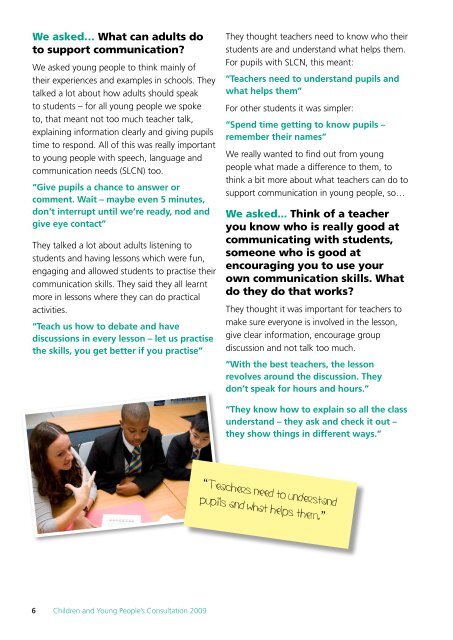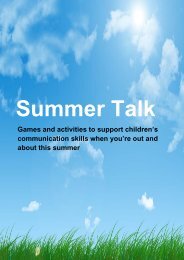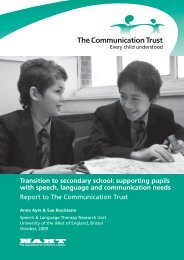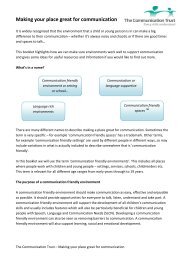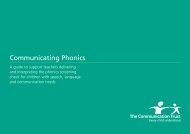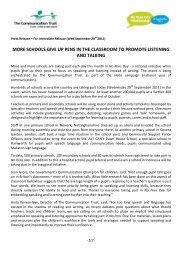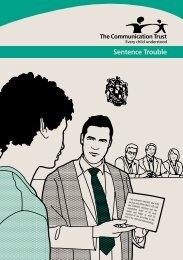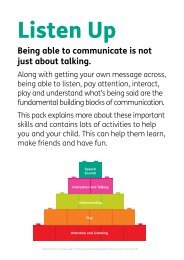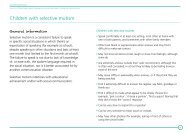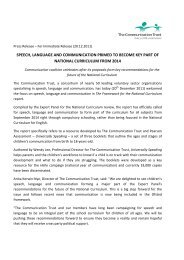What do children and young people think about speech ... - Afasic
What do children and young people think about speech ... - Afasic
What do children and young people think about speech ... - Afasic
- No tags were found...
You also want an ePaper? Increase the reach of your titles
YUMPU automatically turns print PDFs into web optimized ePapers that Google loves.
We asked… <strong>What</strong> can adults <strong>do</strong>to support communication?We asked <strong>young</strong> <strong>people</strong> to <strong>think</strong> mainly oftheir experiences <strong>and</strong> examples in schools. Theytalked a lot <strong>about</strong> how adults should speakto students – for all <strong>young</strong> <strong>people</strong> we spoketo, that meant not too much teacher talk,explaining information clearly <strong>and</strong> giving pupilstime to respond. All of this was really importantto <strong>young</strong> <strong>people</strong> with <strong>speech</strong>, language <strong>and</strong>communication needs (SLCN) too.“Give pupils a chance to answer orcomment. Wait – maybe even 5 minutes,<strong>do</strong>n’t interrupt until we’re ready, nod <strong>and</strong>give eye contact”They talked a lot <strong>about</strong> adults listening tostudents <strong>and</strong> having lessons which were fun,engaging <strong>and</strong> allowed students to practise theircommunication skills. They said they all learntmore in lessons where they can <strong>do</strong> practicalactivities.“Teach us how to debate <strong>and</strong> havediscussions in every lesson – let us practisethe skills, you get better if you practise”They thought teachers need to know who theirstudents are <strong>and</strong> underst<strong>and</strong> what helps them.For pupils with SLCN, this meant:“Teachers need to underst<strong>and</strong> pupils <strong>and</strong>what helps them”For other students it was simpler:“Spend time getting to know pupils –remember their names”We really wanted to find out from <strong>young</strong><strong>people</strong> what made a difference to them, to<strong>think</strong> a bit more <strong>about</strong> what teachers can <strong>do</strong> tosupport communication in <strong>young</strong> <strong>people</strong>, so…We asked... Think of a teacheryou know who is really good atcommunicating with students,someone who is good atencouraging you to use yourown communication skills. <strong>What</strong><strong>do</strong> they <strong>do</strong> that works?They thought it was important for teachers tomake sure everyone is involved in the lesson,give clear information, encourage groupdiscussion <strong>and</strong> not talk too much.“With the best teachers, the lessonrevolves around the discussion. They<strong>do</strong>n’t speak for hours <strong>and</strong> hours.”“They know how to explain so all the classunderst<strong>and</strong> – they ask <strong>and</strong> check it out –they show things in different ways.”“Teachers need to underst<strong>and</strong>pupils <strong>and</strong> what helps them.”6 Children <strong>and</strong> Young People’s Consultation 2009


